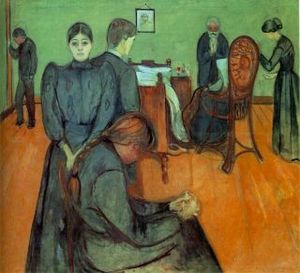In a seminar, I ask each of a group of young pianists to talk very briefly about a piece they know — as they might speak to an audience before performing. I urge them to be pithy, personal, compelling. I don’t like the “Beethoven-was-born-in-1770 approach,” I tell them. Music is important. It engages with the big questions, I say.
One seminar participant asks me to give an example of the sort of commentary I want. So, I say: “Imagine I’m about to play Liszt’s B-Minor Sonata for an audience. I’d go to the piano and say, ‘This is a piece about death.'”
Someone blurts out: “How do you know that?”
Almost as quickly, I retort: “I know that, because it’s a piece in the key of B Minor. And all pieces in B Minor are pieces about Death.”


Bach’s flute badinerie?
I completely agree about students needing to learn to talk about music effectively, although there’s lots and lots of music that’s less about engaging “the big questions” than about entertaining and providing pleasure. (Of course, finding pleasure can be a way of engaging big questions.) I suppose I see what you mean about the Liszt sonata, although I’m not convinced music’s greatest value is in engaging “big questions” – at any rate, I think students (and professionals) struggle more communicating about the lighthearted, playful, not-taking-itself-too-seriously side of music.
One way of thinking about this is to wonder what sort of problems music has solved (or elucidated), and how it’s done this more or less effectively than other ways of engaging big questions. I can think of many great musicians who impress me much more with their music-making than their humanity, and I can think of plenty of relatively unmusical people whose humanity doesn’t seem to suffer from lack of musical insight. I’m not saying it’s causal on either side – rather that it’s easy to get carried away giving music all sorts of grandiose credit. I do it myself often, so I’m intentionally being a little provocative, if only to challenge myself.
Love the blog!
Thanks Michael. And yes, I believe by saying something such as “music engages with the big questions,” I’m trying to provoke, poke some fun at grandiosity, and tell the truth …
Many tears ago, while I was studying the Liszt Sonata in b minor with Adele Marcus, she told me that the opening notes were the first breaths of life. Curiously, after I got the whole piece learned and as close to Adele’s ideal of perfection as one could humanly strive for, I played it straight through for my aunt, herself a poet. When I finished, she said, ‘It tells the story of an entire life, and ends with death’.